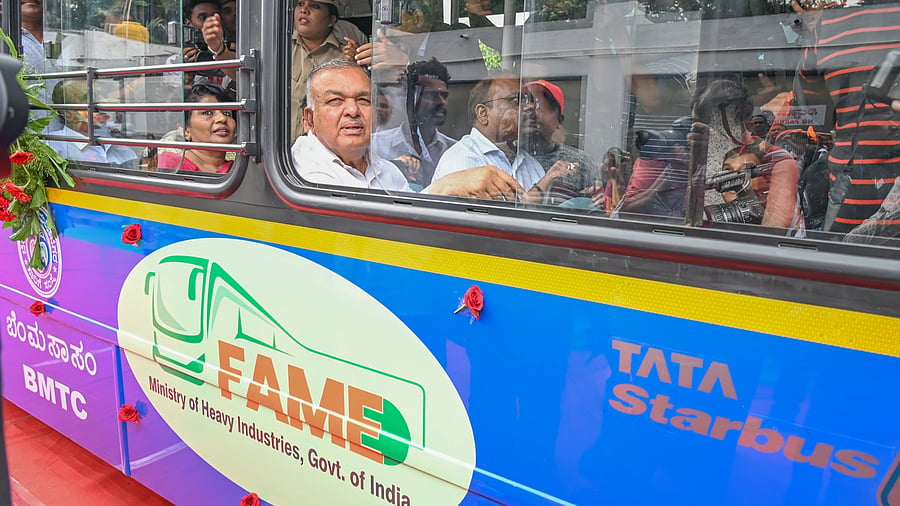
An electric bus that the BMTC leased under the previous FAME scheme of the Ministry of Heavy Industries.
DH FILE PHOTO
Bengaluru: Bengaluru may soon surpass Delhi in public transport bus numbers as the union government has approved 7,000 electric buses for the IT Capital — the highest for any city — under a newly launched scheme.
Under the PM E-DRIVE scheme, Bengaluru will receive 7,000 e-buses, while Hyderabad will get 2,800.
Currently, the Bengaluru Metropolitan Transport Corporation (BMTC) has 6,500-odd buses, including about 1,300 non-AC e-vehicles. It will also lease 320 AC e-buses soon. At over 8,000, Delhi currently has the most buses among all cities in India.
Policymakers and mobility experts agree that given Bengaluru's public transport requirements, the BMTC requires 10,000 to 12,000 buses.
Transport Minister Ramalinga Reddy told DH that buses under the PM E-DRIVE scheme would be procured over three years. However, during this period, many overage vehicles will also need to scrapped, he added.
As per BMTC rules, a bus that runs 11 lakh kilometres or turns 15 years has to be scrapped. It is estimated that the BMTC needs to retire approximately 10% of its fleet annually.
Over the next three years, even if the BMTC loses 2,000 buses — roughly 30% of its current fleet — the addition of 7,000 buses under the scheme will still expand its total fleet to well over 10,000.
The PM E-DRIVE scheme, notified by the Ministry of Heavy Industries on September 29, 2024, provides Rs 4,391 crore in subsidies for the procurement of 14,028 e-buses in nine large cities with a population of 40 lakh or more.
Rs 4,000 crore was allocated for the scheme in the 2025-26 union budget.
Although a new scheme, it incorporates elements of the FAME schemes, which ran from April 1, 2015, to March 31, 2024, and provided Rs 12,395 crore to promote electric vehicles.
Karnataka has agreed on a payment security mechanism for PM E-DRIVE, according to a senior official in the know.
The BMTC will deposit money into an escrow account to pay the bus manufacturer on a per-kilometre basis under the Gross Cost Contract (GCC) model, with a minimum daily assured distance. Except for conductor salaries, all other operational expenses will be borne by the bus manufacturer.
The Centre will provide a subsidy of Rs 35 lakh per standard bus (10-12 metres), Rs 25 lakh (midi bus, 8-10 metres) and Rs 20 lakh (minibus, 6-8 metres).
Only e-buses with an ex-factory price of less than Rs 2 crore are incentivised under this scheme.